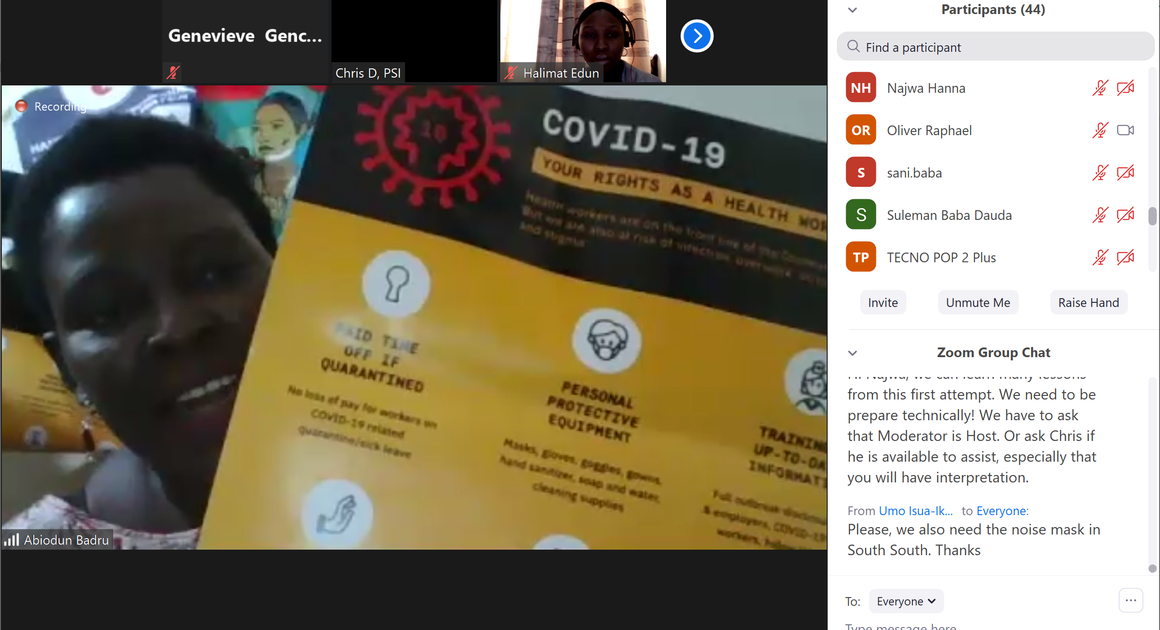IDPs in Nigeria Communiqué issued at the end of the PSI World Refugee Day webinar


The Public Services International is a global trade union federation with over 30 million members in 192 countries including affiliates in Nigeria among which the National Association of Nigeria Nurses and Midwives (NANNM) and the Medical and Health Workers Union (MHWUN) whose members are frontline actors in combating COVID-19.
People affected by humanitarian crises especially displaced people in camps are often faced with specific challenges and vulnerabilities. They are often neglected, stigmatized, and already face difficulties in accessing quality public health services. This is particularly true for many people on the move, such as migrants in irregular situations, migrant workers with precarious livelihoods, or working in the informal economy, victims of trafficking in persons as well as people fleeing their homes because of persecution, war, violence, human rights violations or disaster, whether within their own countries — internally displaced persons (IDPs) — or across international borders — refugees and asylum-seekers.
Speakers at the webinar included representatives of IOM, NCFRMI, NLC, PSI, GIZ, NGOs, frontline health workers from the North-East Nigeria and the General public.
The meeting noted the following facts:
There is an urgent need to address the plight of IDPs in Nigeria from a protection, human rights, and public health perspective, especially at this point where community infections are on the increase.
IDPs are vulnerable to COVID-19 because of the health risks associated with movement, displacement, overcrowding, increased exposure due to substandard shelter and poor nutritional and health status.
There is need for government to recognize the rights, roles, and responsibilities of health workers, including key considerations for their occupational safety and health.
As a result of poor sanitary conditions in some of the IDPs camps, women have to walk distances in the night to go to the toilet. This has led to disturbing reports such as violence and sexual harassment on women.
Demands
Government should include IDPs in the strategy, plans and operations on COVID-19 response in camps and communities especially now that community infections in IDPs camps and host communities are on the increase.
Government should ensure the protection of health workers’ rights during the COVID-19 outbreak and make available adequate supplies of infection prevention and control (IPC) and personal protective equipment (PPEs), such as masks, gloves, goggles, gowns, hand sanitizer, soap and water, cleaning supplies, in sufficient quantity in camp’s healthcare facilities.
Government should address all gaps in protecting the human rights of people on the move to access quality public health services even at this time.
Government need to ensure security of IDPs by providing adequate security and ensure sanitary conditions within the camps. At the same time perpetrators of all gender-based violence including rape should be brought to book.
In the same vein, most of frontline healthcare workers are women and as such, exposed to gender-based violence and even death in line of duty. We demand Government to ensure adequate protection for all frontline health workers.
We call on the Nigerian government to ratify the ILO C190 - Violence and Harassment Convention.
We equally call on the Nigerian Government to domesticate the African union convention for the protection and assistance of internally displaced persons in Africa (Kampala convention).
Conclusion
The Public services international and its affiliates in Nigeria are committed to working together with our government to ensure that COVID-19 marks a turning point for our country, moving us towards a more accessible quality public services especially for the internally displaced persons, along with decent working conditions for all frontline health care workers. We are ready to join force with the Government to ensure a revaluing of frontline public sector workers as the foundation for attaining the universal health coverage in Nigeria.
